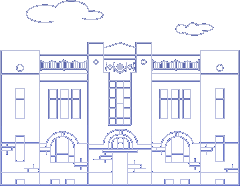Repertoire, Innovation Found at Saratov Theater
|
Periodical: The Moscow Times Date: 25.05.2010 Author(s): John Freedman |
It is the oldest professional children’s theater in the world. But it is a lot more than that.
A list of the international projects of the Saratov Theater Yunogo Zritelya for the first decade of the 2000s shows nearly two dozen major productions, laboratories or tours that the playhouse has engaged in with partners from six countries.
One of the biggest-ever projects of this theater, founded in 1908, will take place in the fall when famed American director Lee Breuer arrives to stage a new translation of Sam Shepard’s “The Curse of the Starving Class.”
This production, which will rehearse throughout September, is expected to open Oct. 11. That bit of information was revealed to me by the theater’s managing director Valery Raikov last weekend while I was in Saratov. And if dates in Russian theater have a way of slipping and sliding with the passage of time – premieres often are put off at the last moment – you get the feeling that there will be none of that with this project.
You get the sense that when Raikov, who is soft-spoken but clear in everything he says, sets a date for Oct. 11, it is going to happen.
The relationship with Breuer grew out of a master class that the director and his actress wife Maude Mitchell conducted in Saratov almost exactly a year ago. The director and the theater hit it off, and plans were made for bigger things.
It turns out to be a significant opportunity for Sam Shepard, too. Shepard, one of the most influential American playwrights of the last five decades, has never quite caught on in Russia. A few minor productions in Moscow have come and gone without attracting lasting attention. Breuer’s interpretation of “Starving Class” at one of Russia’s top regional theaters is bound to have an impact.
But the Saratov TYuZ, as most people call it, is anything but a one-trick theater.
Но Саратовский ТЮЗ, как его часто называют – это что угодно, но не театр-одного-события.
Previous collaborations with American theater include a 2008 production of Tennessee Williams’ “The Glass Menagerie” by Walter Schoen, a director and actor from Virginia. The theater then toured to Richmond, Virginia, with productions of two Russian classic plays, Fyodor Dostoevsky’s “Uncle’s Dream” and the beloved children’s fairy tale “The Humpbacked Horse.”
Raikov has organized numerous collaborations with French artists and theaters in connection with the current Year of France in Russia and Russia in France. At the end of December the theater unveiled a production of French writer Jean-Marie Chevret’s “SQUAT.” In July French director Jean-Claude Fall will stage a new interpretation of Edmund Rostand’s perennially popular “Cyrano de Bergerac.”
Among other international collaborations, a production of Eduardo de Filippo’s “Marriage Italian Style” by Italian director Paolo Emilio Landi was awarded the coveted Russian State Prize in 2003.
Some cross-cultural projects originate closer to home.
Georg Genoux is a German director who has lived, studied and worked for more than a decade in Russia. The founder of the edgy Joseph Beuys Theater that performs in Moscow at the popular Aktovy Zal venue, he also has established a working relationship in Saratov.
His most recent outing there was a bold production of Erich Maria Remarque’s “Three Comrades,” a gritty tale of three German World War I veterans struggling to make a life as Fascism and World War II loom large on the horizon.
“Three Comrades” opened in March and, despite some controversy, the show plays to packed and mostly enthusiastic houses.
When I attended a performance on Friday night, one woman in a hall seating 500 stood up and left the theater demonstratively when actors playing a group of Fascist soldiers marched through the hall shouting slogans. The other 499 remained to give the show a standing ovation during the curtain calls.
Raikov explains that after the early performances in May, as many as a quarter of the people he talked to were upset and wanted to know why he had allowed this picture of Weimar Germany to be staged just before the 65th anniversary of Victory Day.
“But,” the managing director added with satisfaction, “three out of four were very moved by the story.”
Indeed, under the quirky and strong direction of Genoux, this show filled with songs sung in German comes across as a story of individuals remaining human against all odds in a society that is becoming increasingly inhumane. It is that personal, human touch that makes the show so impressive.
These characters could be people of any nationality. The fact that they are German seems to be little more than an afterthought in the context of Genoux’s production.
The personal, human touch is very much evident in everything about the Saratov Theater. Genoux insists that the seven weeks he spent rehearsing “Three Comrades” were “the most satisfying seven weeks of my life.” The reasons for that are the commitment and the enthusiasm of everyone who works in the theater.
Saratov Theater Yunogo Zritelya is as busy now as it ever has been. With a troupe of 66 actors, Raikov keeps an extraordinarily large repertory running on three different stages. At present there are 41 shows playing in rotation. Many, Raikov points out, have been in repertory for 10 or 15 years and have been performed 400 times or more.
Sourse: http://www.themoscowtimes.com/columns/1289/article/repertoire-innovation-found-at-saratov-theater/406782.html
Назад в раздел

«We are the ones! We are here!»

«The Hedgehog and the Christmas Tree»

«How to Find a Road to the Sun?»

«...and all the stars above us »

«To Be or Not to Be? Without Question»

«The Snow Maiden (Snegurochka)»

«Sophocles. Oedipus the Tyrant»

«The Curse of the Starving Class»











































